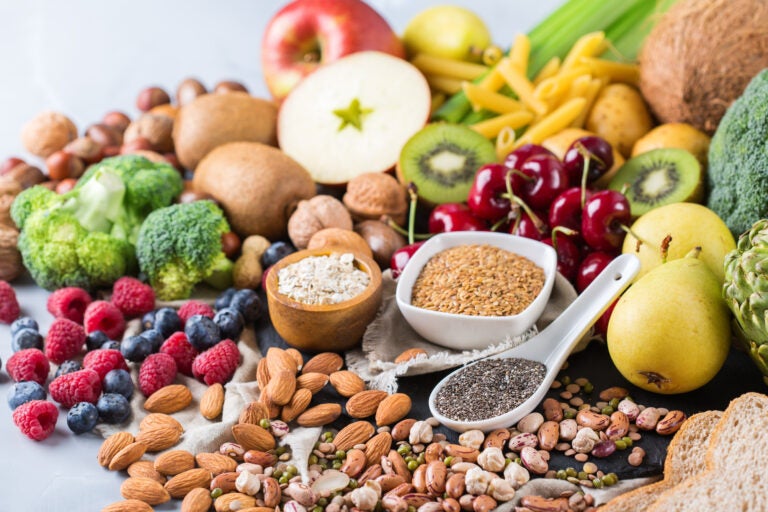A balanced diet with enough soluble fiber supports healthy digestion and heart health. The best food sources of soluble fiber include fruits, vegetables, legumes, and whole grains. Unlike insoluble fiber, soluble fiber absorbs water and forms a gel-like texture in the gut, which slows digestion and stabilizes blood sugar. Foods like oats, beans, apples, and citrus fruits not only improve bowel health but also reduce cholesterol levels. Adding more fiber-rich foods to meals ensures lasting energy and smoother digestion. In this guide, we explore the most effective and natural sources of soluble fiber you can enjoy daily.

Understanding Soluble Fiber
Soluble fiber dissolves in water and turns into a gel inside the intestines. This slows digestion, helps control blood sugar, and lowers bad cholesterol. Unlike insoluble fiber, which adds bulk to stool, soluble fiber works by softening stool and nourishing good gut bacteria. Regular intake supports weight control by increasing fullness. Knowing the difference between fiber types allows you to make smarter dietary choices. Aiming for 5–10 grams of soluble fiber per day helps maintain overall digestive balance and heart health.
Oats: A Classic Choice
Among the best food sources of soluble fiber, oats stand out. A bowl of oatmeal provides beta-glucan, a powerful soluble fiber that lowers cholesterol and promotes satiety. Eating oats regularly also improves blood sugar control, making them ideal for people with diabetes. Overnight oats, oat bran muffins, or oat-based smoothies are easy ways to add this nutrient. Combining oats with fresh fruits like apples or berries further boosts fiber content. As a simple breakfast or snack, oats remain one of the most accessible and versatile fiber-rich foods.
Beans and Legumes
Beans and legumes are powerhouse foods rich in soluble fiber. Black beans, lentils, chickpeas, and kidney beans contain pectin and resistant starch that support gut bacteria. They also supply protein and minerals, making them excellent for heart health. Adding a cup of lentil soup or chickpea salad provides a significant fiber boost. Since legumes also stabilize blood sugar, they benefit people aiming for better energy balance. Combining beans with whole grains like rice or quinoa creates a nutrient-dense, high-fiber meal. For anyone looking to increase soluble fiber intake, legumes are a reliable, affordable choice.

Fruits Rich in Soluble Fiber
Fruits are among the tastiest fiber-rich foods. Apples, oranges, pears, and berries provide pectin, a type of soluble fiber that improves digestion and supports heart health. Citrus fruits also supply vitamin C while lowering cholesterol levels. Bananas add resistant starch, which feeds beneficial gut bacteria. Eating fruit with the skin provides extra fiber and nutrients. A daily mix of fresh and seasonal fruit ensures steady energy and digestive comfort. Smoothies, fruit salads, or simply a fresh apple make it easy to include more soluble fiber in your diet without extra effort.
Vegetables and Root Crops
Many vegetables provide valuable amounts of soluble fiber. Carrots, broccoli, and Brussels sprouts help lower cholesterol and promote gut health. Root vegetables like sweet potatoes contain both soluble and insoluble fiber, giving a balanced benefit. Adding roasted carrots or a broccoli stir-fry to meals improves daily fiber intake. Vegetables also contain antioxidants that fight inflammation, enhancing digestive comfort. Eating a colorful variety ensures you get a broad spectrum of nutrients along with the right amount of soluble fiber for daily wellness.
Seeds, Nuts, and Whole Grains
Chia seeds, flaxseeds, and psyllium husk are concentrated soluble fiber sources. When mixed with water, they form a gel that eases bowel movements. Almonds, walnuts, and other nuts also provide fiber along with healthy fats. Whole grains like barley and rye supply beta-glucan, which reduces cholesterol. Adding a spoon of chia seeds to yogurt, or sprinkling flaxseeds on salads, is a simple upgrade. Regular use of seeds and nuts creates long-lasting energy and digestive comfort while boosting overall fiber intake naturally.
Conclusion
Choosing the best food sources of soluble fiber ensures better digestion, lower cholesterol, and stronger gut health. From oats and beans to fruits, vegetables, and seeds, these foods are simple to include in daily meals. Consistent intake supports heart health, blood sugar balance, and long-term digestive comfort. Instead of relying on supplements, focus on natural, whole-food fiber. By making small, mindful choices, you can improve your health one fiber-rich meal at a time.
